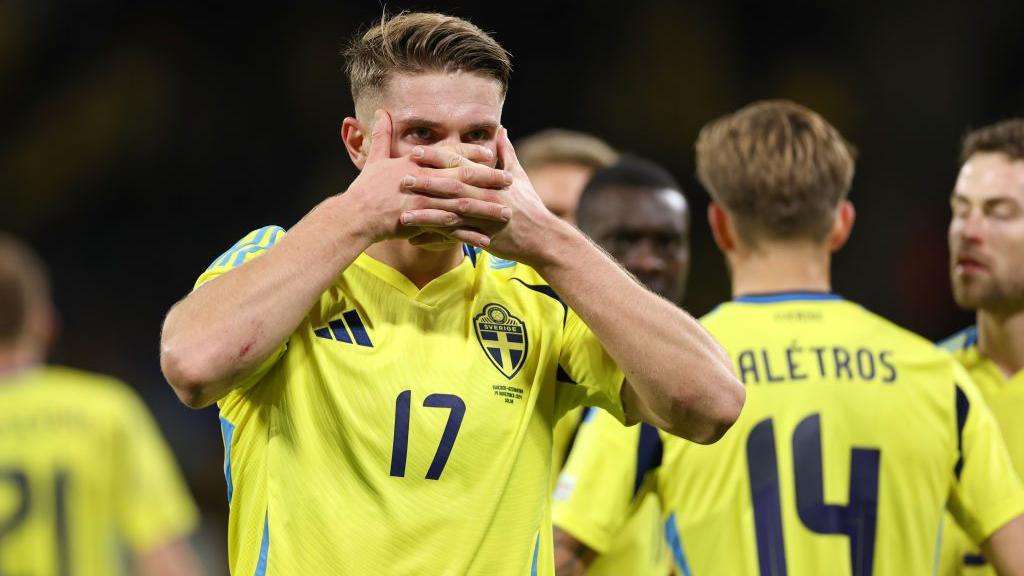 Image source, Getty Images
Image source, Getty Images
Viktor Gyokeres made his senior debut at Brommapojkarna aged 16 and has since gone on to represent Sweden 26 times, scoring 15 goals
"We don't have a lot of people in the stands, but we surely have a lot of scouts," explains Erik Nathorst Windahl, academy manager at Brommapojkarna. "In some games, mainly in the academy, it's the mums, dads... and then scouts."
That is because Swedish top-flight outfit Brommapojkarna, while relatively unknown outside of their own country, have become a hotbed for young talent.
Notable alumni include Tottenham Hotspur pair Lucas Bergvall and Dejan Kulusevski, as well as Borussia Dortmund's Daniel Svensson.
But the current highest-profile former BP youngster is Viktor Gyokeres, the 27-year-old Swedish striker who is on the verge of joining Arsenal from Sporting CP in a £63.5m deal.
Gyokeres, however, was not always regarded as one of Sweden's brightest prospects, with the forward playing for regional side IFK Aspudden-Tellus until the age of 15, when he joined BP.
Nathorst Windahl, who has worked for BP since 2009 and became academy manager in 2021, admits: "It's really rare that a player can be at a smaller club [until that age] and then go to a big academy.
"Maybe he would have been even better if he came to us earlier than he did. But on the other hand, he was the top scorer and got all the passes when he played in his club.
"I can't find a player now who is in our national team or has been in our club that has been in a smaller club for so long and then goes to an academy, so actually it's unique.
"He was a late bloomer. There were a lot of boys born in 1998 in Sweden that had a higher rank than him."
At BP, Gyokeres blossomed into a clinical and unrelenting finisher. He made his debut aged 16 and a tally of 25 goals in 67 games piqued Brighton's interest.
"He played one year in our academy before he went to the senior team, because he was mentally ready to play against men when he was still a boy," adds Nathorst Windahl.
"When he came here, he was a good striker but when he left I think he had the whole package."
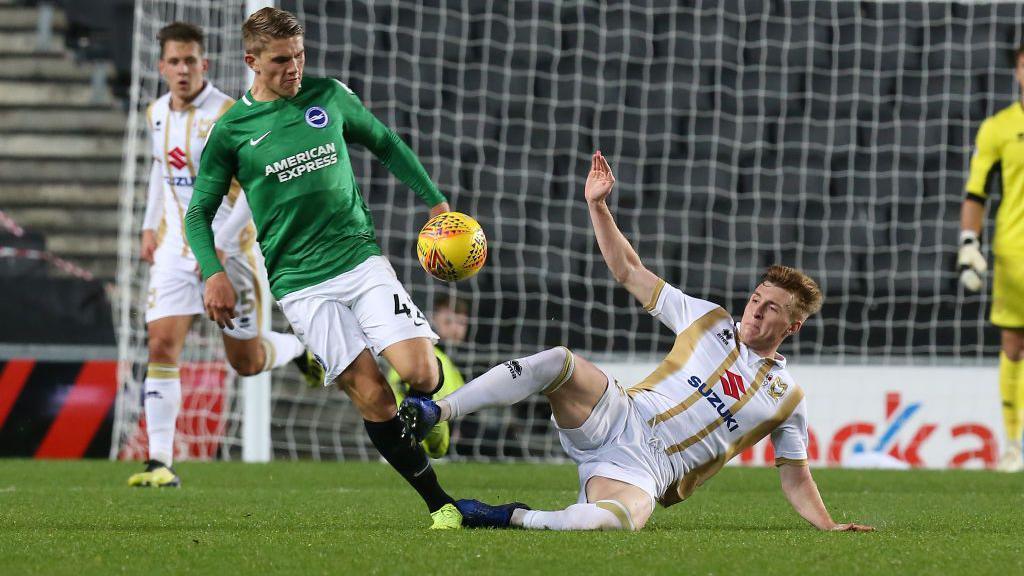 Image source, Getty Images
Image source, Getty Images
Gyokeres joined Brighton from Brommapojkarna in January 2018 but struggled to make an impact and was sent out on several loans before joining Coventry in 2021
Gyokeres is one of many players who have benefited from Brommapojkarna's footballing school.
They boast the title of Europe's largest club when it comes to number of youth teams - there are more than 4,500 members split across 250 various youth teams at different age groups.
The numbers are large but the process is efficient and utilised to ensure each player is maximising their ability.
Most play for one of BP's grassroot sides, with the more talented players representing the club's A to C teams. In one under-16 division, Brommapojkarna have had to be capped at three teams.
Englishman Shaun Constable managed the Stockholm outfit between December 2019 until December 2020.
"When you're driving around the Grimsta or Bromma area, there's never a pitch that's empty," he says. "And normally you're watching some kind of game going on with black and red stripes - the BP are everywhere.
"You have that many kids and teams in the same age groups, you need pitches everywhere."
Coaches from different age groups, as well as the senior team, work between squads to allow players to transition as seamlessly as possible.
"I would say that this kind of work is really unique in Swedish football," says BP's sporting director Philip Berglund. "I have worked in several clubs but no clubs work in this way.
"We have integrated three teams together in a way that the under-17 coaches and under-19 coaches are also with the first team as assistant coaches, and our first team coaches also work two days a week with the youth teams.
"We don't want them as different kind of islands. It also makes it easier for us to integrate the youth players in the first team when the first team coach knows exactly everything about our biggest talents."
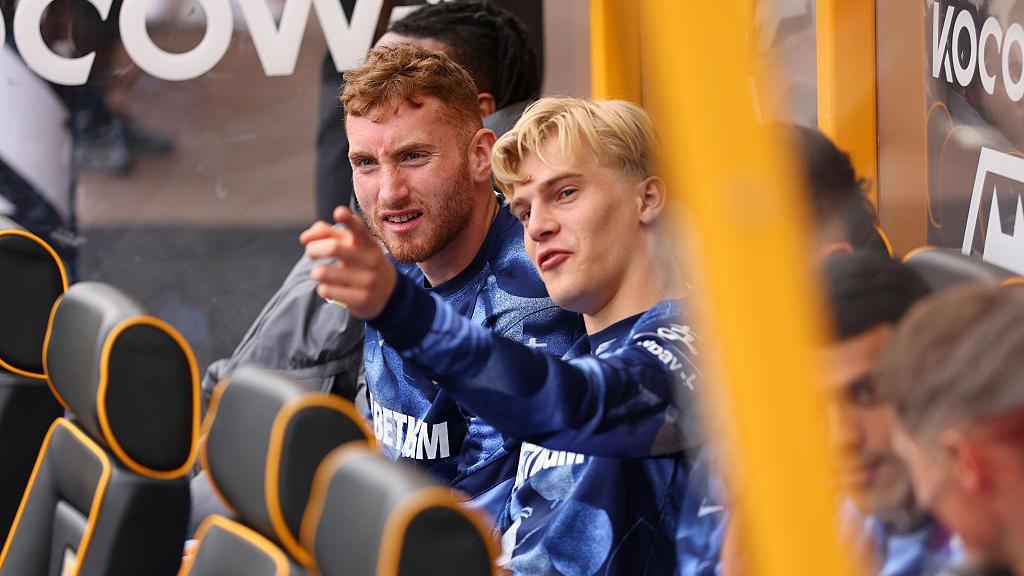 Image source, Getty Images
Image source, Getty Images
Kuusevski and Bergvall both now play for Tottenham Hotspur
Another impressive feature of BP's operation is that many of their players come from Stockholm or the surrounding areas - like Gyokeres, Kulusevski and Bergvall.
Berglund adds: "I think it's really important that you try to do the best of everything in Stockholm before you try to see different cities."
Nathorst Windahl explains: "We have the history in Stockholm that Brommapojkarna has always been number one in talent and scouting, that's one of our key successes.
"Every player knows the other players that have been here and gone on to become professional have always spoken about the time at Brommapojkarna as the foundation that got them to where they are today.
"It is like religion. If you think that we can help you in giving you a good chance to become a professional player, then you have to believe us, trust us, follow us.
"It's rare that we bring players in from different cities in Sweden, so when I saw Barcelona bring players from Asia, we brought a player in who was 15 minutes away by bus."
BP have enjoyed great success against big European teams such as Paris St-Germain and Ajax in their lower age groups, but Nathorst Windahl says beyond the age of 15 it can be difficult to compete.
Kulusevski, for example, left Brommapojkarna at 15 to join Atalanta's academy, before moving on to Juventus two years later and then Tottenham in January 2022.
Tipped for big things as a youngster by Nathorst Windahl, the 25-year-old has won Sweden's Guldbollen, an award given to the country's best player, in two of the past three years. Gyokeres took the prize in 2024.
Bergvall, meanwhile, came through BP's ranks, helping them win promotion back to the top flight before moving to Swedish champions Djurgarden. He joined Spurs aged 18 last summer.
"Lucas is the perfect central midfielder. I think that he can play in any club in the world. No problem," says Nathorst Windahl.
"I think that he is the Swedish player that the younger boys from Sweden and Scandinavia should have on their walls, because he is going to be the best.
"When you are a young boy, you like the goalkeeper because you are a goalkeeper or maybe the top scorer, or the one with the coolest haircut.
"But if you look at Lucas, he looks like a model. He can run, he can shoot, he can pass and dribble.
"We are happy that we have helped him from six years old to 17 to then be where he is today.
"I don't like the word talent, but he was a talent from the day he was born."
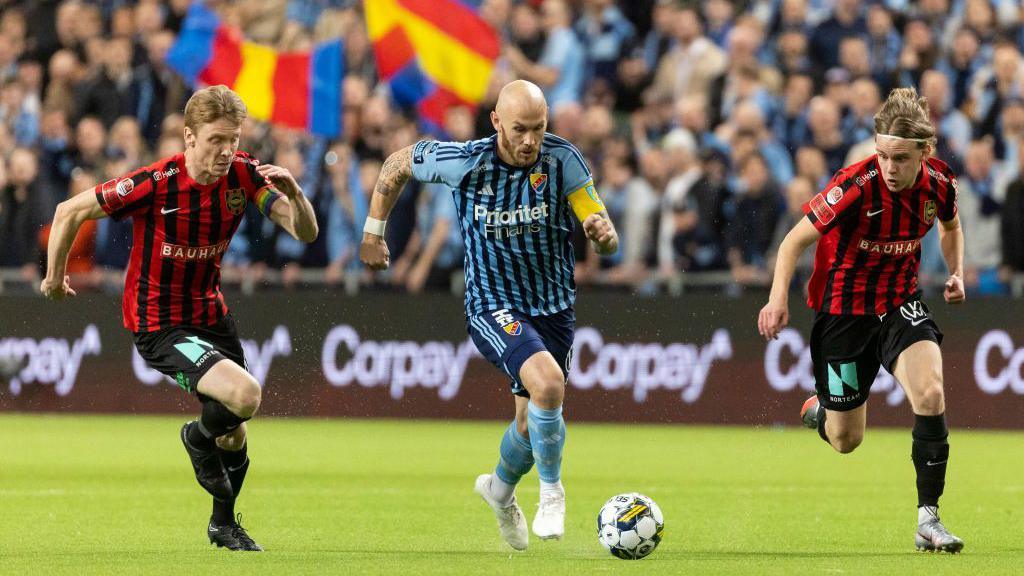 Image source, Getty Images
Image source, Getty Images
Brommapojkarna, in red and black stripes, are playing their second season back in the Swedish top flight after dropping into the third tier in 2020
It is Gyokeres, however, who is set to become the most expensive player to emerge through the club, despite struggling after initially joining Brighton.
A move to Coventry helped him regain that scoring threat and in Lisbon he became lethal - with 97 goals in 102 appearances for Sporting, prompting Arsenal's interest.
"I think what we have seen in Sporting now is what we have seen him do in the First and Second Division in Swedish football," says Nathorst Windahl.
"The most important thing for Viktor is to be in a club where he starts every game and where he can be Viktor Gyokeres and not just another player to impress the coach.
"It's not ego, not at all, but I think that he chose clubs due to that strategy. So when he went to Sporting Lisbon, I think that he thought 100% that he was going to be the star."
For Brommapojkarna - who draw crowds of around 10% of Stockholm neighbours AIK's average 38,525 attendance this season - these success stories help keep eyes on the club, where they rely on selling on their best young talent.
"The biggest income in the club is the transfer income because we don't earn enough money with the supporters," says Berglund. "We don't have so many fans, but we have a few and we love them.
"But it's not making enough money, so we need to sell players every year, almost like the biggest club in the Swedish league, and we do that and it is fantastic."

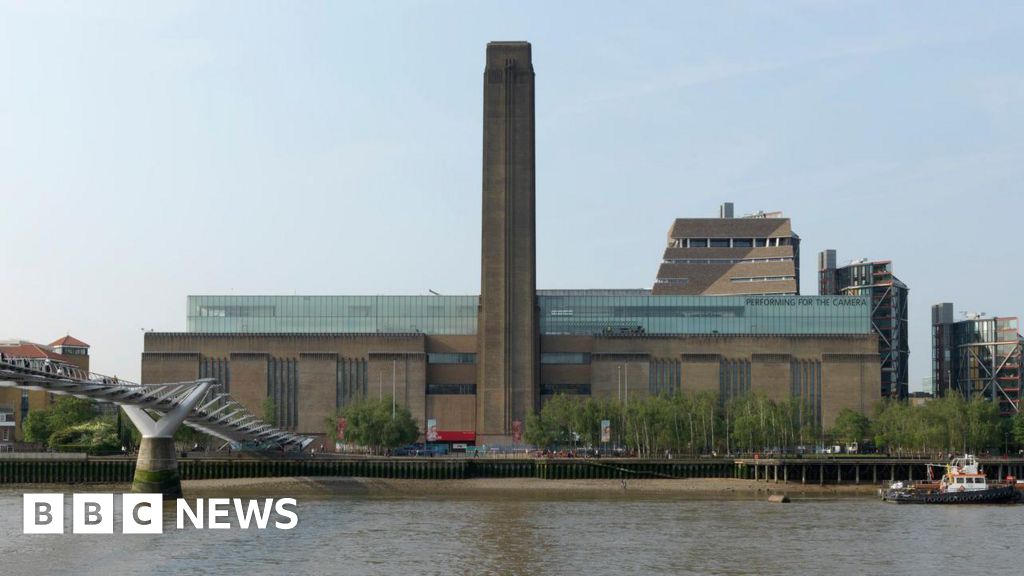
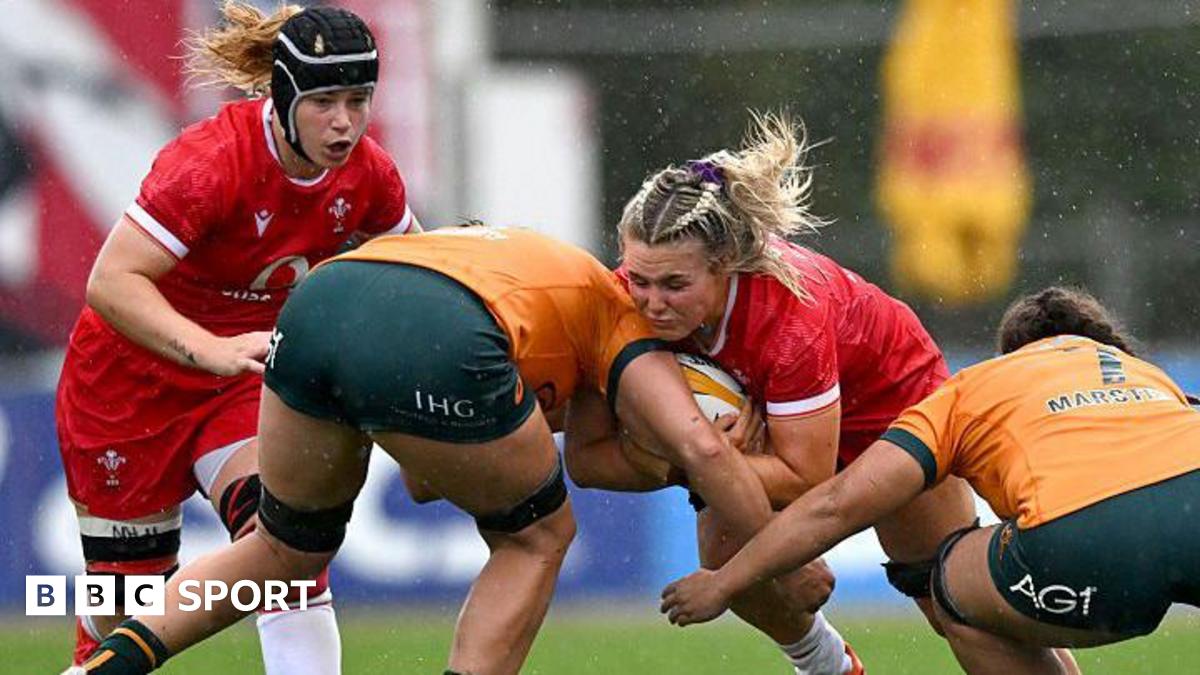
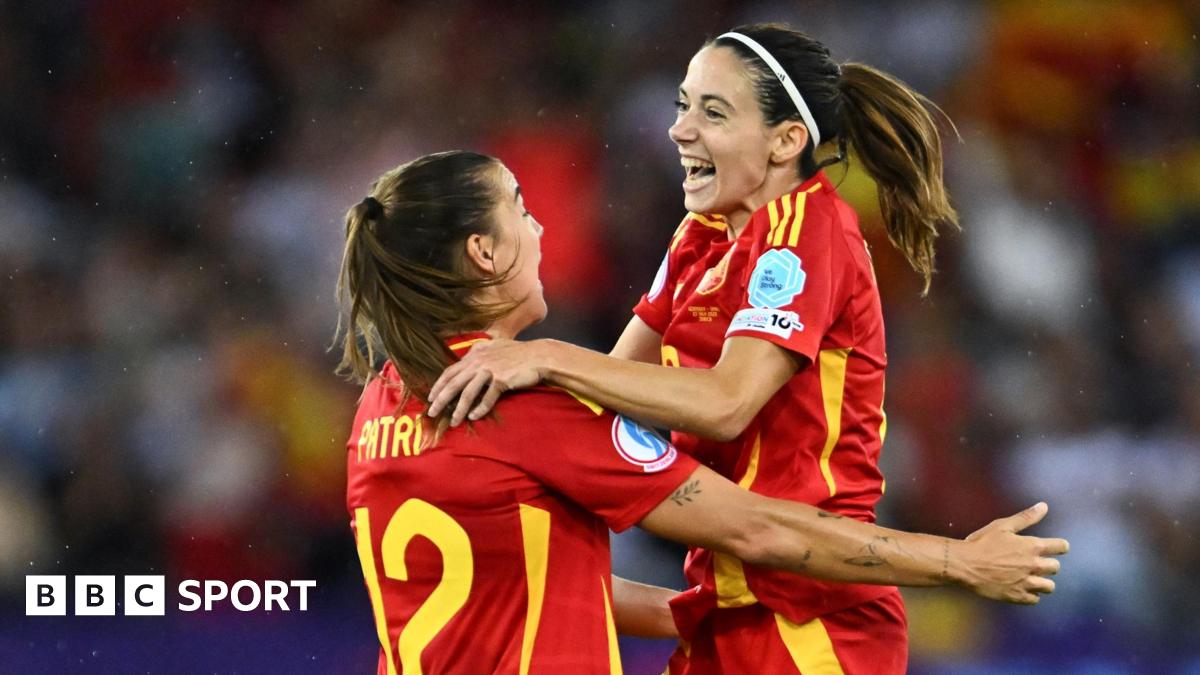
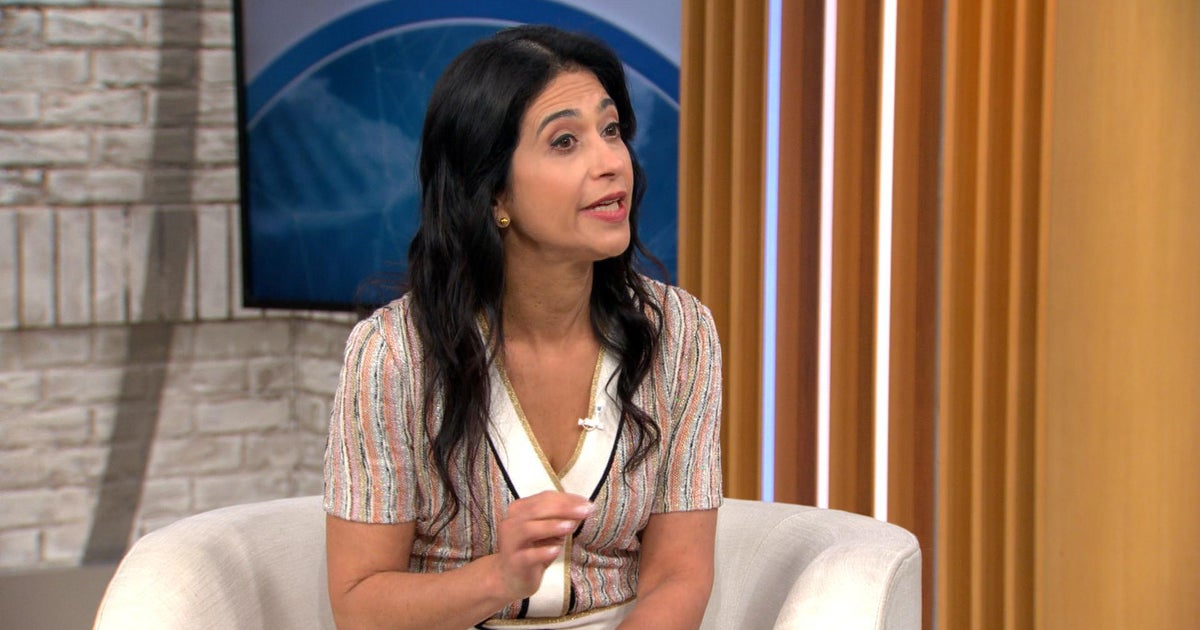

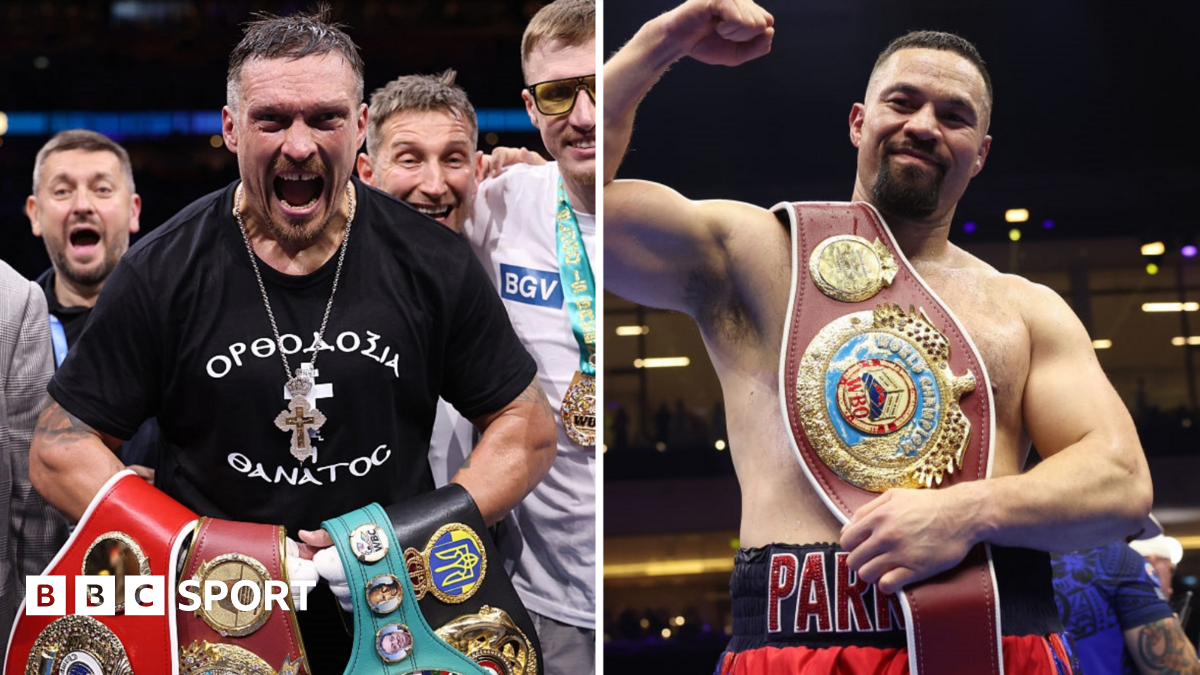

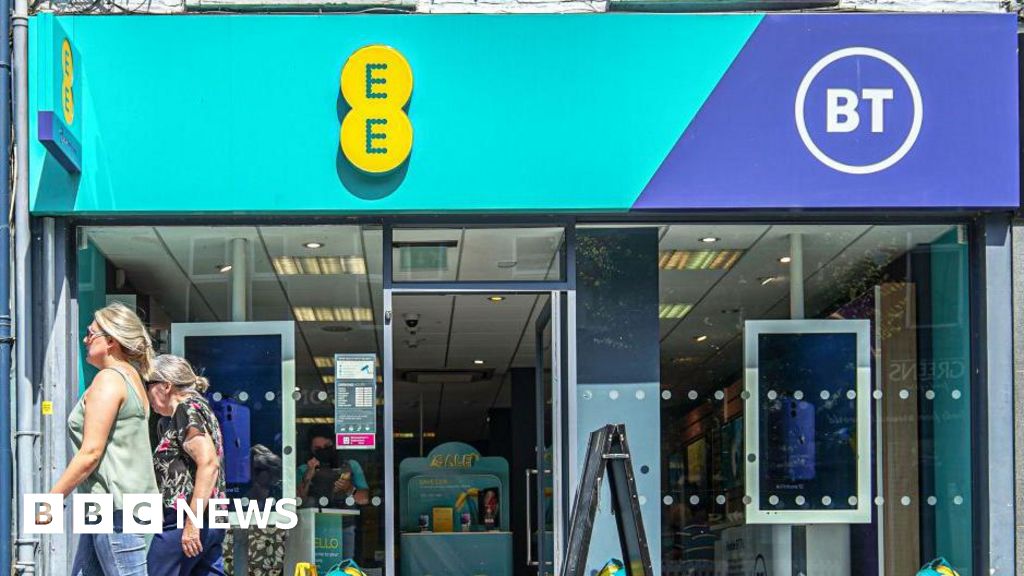
 English (US) ·
English (US) ·